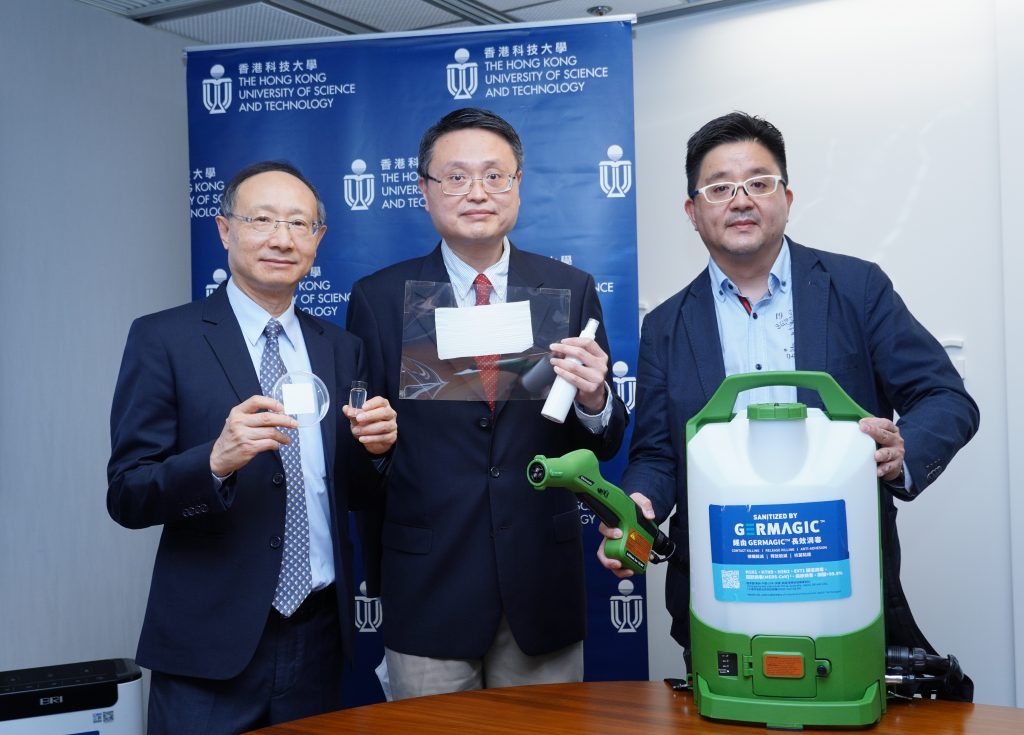HKUST Develops New Smart Anti-Microbial Coating Against COVID-19
March 12, 2020
Researchers at The Hong Kong University of Science and Technology (HKUST) have developed a Multilevel Antimicrobial Polymer (MAP-1) coating that is effective in killing viruses, bacteria and even hard-to-kill spores. MAP-1 can inactivate* up to 99.9 per cent of highly-infectious viruses such as measles, mumps and rubella, and 99.99 per cent of the surrogate feline calicivirus (FCV) - a gold standard for disinfection efficiency and is more resistant than coronaviruses such as the one responsible for COVID-19 epidemic.
MAP-1 coating is confirmed to be effective against drug-resistant microorganisms during two field studies in the Kowloon Hospital and Haven of Hope Woo Ping Care and Attention Home. Its use in hospital privacy curtains saw over 98.7% reduction in drug-resistant bacteria in 3 weeks. Beyond hospitals, the team works with the Water Supplies Department and the Drainage Service Department to field test MAP-1 in coating materials for water pipes and sewage drainages to prevent microbial contamination and infrastructure corrosion.
Developed by a team led by Prof. YEUNG King Lun, Professor of the Department of Chemical and Biological Engineering and the Division of Environment and Sustainability, the new MAP-1 coating is highly versatile with an effective period of up to 90 days. MAP-1 coating provides lasting protection and surface disinfection against microbial contamination. This product is designed for use on different surfaces including metals, concrete, wood, glass, plastics as well as fabrics, leathers and textiles without changing the materials’ appearance and tactile feel. According to the Technical Standard for Disinfection issued by the National Health Commission in Mainland China, the coating is proven to be non-toxic and is safe for skin and the environment, hence it also allows MAP-1 to be made into hand sanitizers, paints and coating, filter materials for air and water purification, as well as clothing and surgical masks to safeguard the health of the individual and public.
The essence of new coating technology lies with the creation of surface moieties that actively disrupts the microbial envelope and biomolecules, rendering the microorganisms nonviable upon contact. The coating also prevents microbial adhesion on the surface and thus keeping it clean from microbial contaminants. Using a special blend of antimicrobial polymers, the new coating effectively kills up to 99.99 per cent of bacteria and viruses through contact killing and anti-adhesion technology, including Rubella, avian influenza, H1N1 and FCV – a non-enveloped virus which is among the hardest to kill. According to U.S. EPA (Environmental Protection Agency) guideline in 2016, being effective against FCV is equivalent to being able to inactivate the coronavirus – an enveloped virus which are easier to sterilize than the non-enveloped ones.
In efforts to help the society fight the Covid-19 outbreak, HKUST, in collaboration with its industrial partner Chiaphua Industries Limited (CIL), has applied the smart coating to over 70 daycare centers, elderly homes, kindergartens, primary and secondary schools. Other venues include shopping malls, school buses, churches and sports training facilities. CIL has also donated up to HK$1.5 million worth of anti-microbial air filters – a potent air purification technology developed by Prof Yeung’s team in 2017, to various hospitals in the mainland, including Wuhan’s emergency Huoshenshan Hospital.
“Thanks to the long-term support of our industrial partner Chiaphua Industries Ltd, our team is able to develop MAP-1 as a potent solution for infection control. We ran a seven-months field trial of the coating on privacy partition curtains in a local public hospital and six months study on bed linens in an elderly home, and the results is very encouraging, with the total amount of bacteria reduced by over 99% and 95.8% on the curtains and ben linens respectively,” Prof. Yeung said.
This research is a classic example of co-operation among academia, industry and the government. With funding support from both CIL and the Innovation and Technology Commission (ITC), HKUST set up a joint laboratory with CIL in May 2018 to translate conceptual ideas and research on innovative environmental health technologies into tangible products to address societal needs. This coating is the first prominent finding of the lab since its incorporation.
*Inactivating a virus literally means killing it, but it’s more proper to use the word ‘inactivate’ as virus is not considered alive, they only replicate and propagate when they find a host.
Electro spinning of MAP-1 nanofiber for the filter layer of surgical masks: https://www.youtube.com/watch?v=GwPQV9bXYT4&feature=emb_title

